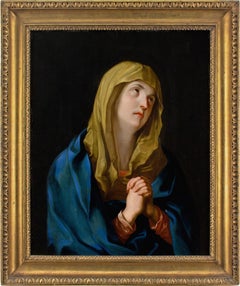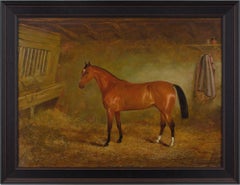Want more images or videos?
Request additional images or videos from the seller
1 of 13
Robert Walker Macbeth RARobert Walker Macbeth RA ROI RWS, Far From The Madding Crowd1883
1883
$9,621.15List Price
About the Item
- Creator:Robert Walker Macbeth RA
- Creation Year:1883
- Dimensions:Height: 45 in (114.3 cm)Width: 28 in (71.12 cm)
- Medium:
- Movement & Style:
- Period:
- Condition:Assessed and approved by our conservator. Cleaned. Revarnished. Canvas relined. Fine and settled craquelure, as you would expect. The paint layer is stable.
- Gallery Location:Cheltenham, GB
- Reference Number:1stDibs: LU2328214340102
About the Seller
5.0
Platinum Seller
Premium sellers with a 4.7+ rating and 24-hour response times
Established in 2017
1stDibs seller since 2023
244 sales on 1stDibs
Authenticity Guarantee
In the unlikely event there’s an issue with an item’s authenticity, contact us within 1 year for a full refund. DetailsMoney-Back Guarantee
If your item is not as described, is damaged in transit, or does not arrive, contact us within 7 days for a full refund. Details24-Hour Cancellation
You have a 24-hour grace period in which to reconsider your purchase, with no questions asked.Vetted Professional Sellers
Our world-class sellers must adhere to strict standards for service and quality, maintaining the integrity of our listings.Price-Match Guarantee
If you find that a seller listed the same item for a lower price elsewhere, we’ll match it.Trusted Global Delivery
Our best-in-class carrier network provides specialized shipping options worldwide, including custom delivery.You May Also Like
Cornish Fisherman Standing Smoking Clay Pipe Antique Newlyn School Oil Portrait
Located in Cirencester, Gloucestershire
Portrait of a Fisherman with a Pipe
Newlyn (Cornish) School, 19th century
oil painting on canvas, unframed
canvas : 20 x 16 inches
provenance: ...
Category
19th Century Victorian Portrait Paintings
Materials
Canvas, Oil
Portrait of a Young Gentleman English circa 1860's Period Framed Oil Painting
Located in Cirencester, Gloucestershire
19th century English school
Portrait of a young gentleman (a scholar?) in dress suit
oil on canvas, framed
framed: 21 x 19.5 inches
canvas: 14 x 1...
Category
Mid-19th Century Victorian Portrait Paintings
Materials
Canvas, Oil
$1,855
H 21 in W 19.5 in D 1 in
1890's French Portrait of Character Man Signed & Dated 1896 titled oil painting
Located in Cirencester, Gloucestershire
Portrait of "H.C" aged 44 years old
French artist, indistinctly signed
dated 1896
oil on canvas, unframed
canvas: 24 x 20 inches
provenance: private collection, France
condition: old...
Category
Late 19th Century Victorian Portrait Paintings
Materials
Oil, Canvas
Very Large Mid 19th Century Victorian Portrait English Gentleman Seated Leather
Located in Cirencester, Gloucestershire
The Victorian English Gentleman
Portrait of a Man seated in a leather chair, holding a letter in his hand.
oil on canvas , framed
framed: 41 x 33 inches
canvas: 36 x 28 inches
prove...
Category
Mid-19th Century Victorian Portrait Paintings
Materials
Oil, Canvas
Huge Antique European Portrait of Girl with Plaits in Hair oil on canvas
Located in Cirencester, Gloucestershire
Portrait of Girl with Plaited Hair
European School, late 19th century
oil on canvas, unframed
canvas: 36 x 30 inches
provenance: private collection, UK
condition: good and sound cond...
Category
Late 19th Century Victorian Portrait Paintings
Materials
Oil, Canvas
Portrait of Gentleman with Cigar Large 19th Century British Oil Painting
Located in Cirencester, Gloucestershire
Portrait of a Gentleman with a Cigar
English artist, mid 19th century
oil on canvas, unframed
canvas: 30 x 25 inches
provenance: private collection, England
condition: overall good a...
Category
Mid-19th Century Victorian Figurative Paintings
Materials
Oil, Canvas
Mid Victorian Portrait of a Lady Seated in a Chair Original 19th Century Oil
Located in Cirencester, Gloucestershire
Portrait of a Seated Lady
English School, mid 19th century
oil on canvas, unframed
canvas: 16 x 13 inches
provenance: private collection, England
condition: good and sound condition
Category
Mid-19th Century Victorian Portrait Paintings
Materials
Oil, Canvas
Large 19th Century French Portrait of Lady with Roses & Smart Dress oil painting
Located in Cirencester, Gloucestershire
Portrait of a Lady
French School, 19th century
oil on canvas, framed
framed: 34 x 29 inches
canvas: 30 x 25 inches
provenance: private collection, France
condition: very good and sou...
Category
19th Century Victorian Portrait Paintings
Materials
Oil, Canvas
Huge Victorian Oil Painting by Famous Artist Portrait Country Girl in Harvest
By Charles Sillem Lidderdale
Located in Cirencester, Gloucestershire
The Gleaner
by Charles Sillem LIDDERDALE (British, 1831-1895)
signed & dated 1890
oil painting on canvas,
framed in what we believe to be the original frame
framed: 51.5 x 37.5 inch...
Category
Late 19th Century Victorian Figurative Paintings
Materials
Oil, Canvas
$8,109
H 51.5 in W 37.5 in D 1 in
Very Large 1840s English Portrait of a Country Gentleman Holding Times Newspaper
Located in Cirencester, Gloucestershire
"The Corn Bill"
English Artist, circa 1840's, unsigned
oil on canvas, framed in antique gilt scrolled and swept frame
framed: 45 x 37 inches
canvas: 36 x 28 inches
provenance: private collection, UK
condition: very good and sound condition; please note the frame is very vulnerable and fragile and as such we are happy to include it free of charge with the painting but cannot warranty its condition on arrival.
Historically significant portrait of this early Victorian...
Category
Mid-19th Century Victorian Portrait Paintings
Materials
Oil, Canvas
$4,466
H 45 in W 37 in D 3 in
More From This Seller
View AllEarly 19th-Century Central European School, Christ The Saviour
Located in Cheltenham, GB
This early 19th-century central European oil painting depicts Christ The Saviour standing atop an orb and carrying a cross over his left shoulder.
An unusual composition, Christ’s rather striking posture is perhaps more ‘Saturday Night Fever’ than it is sacramental. However, the iconography is archaic and derived ultimately from New Testament illustrations dating to the Middle Ages. Depictions of orbs are usually symbolic of the universe, while the cross alludes to redemption. Hence, it’s a visual representation of Christ as the Saviour of humanity.
Francisco de Zurbarán...
Category
1830s Portrait Paintings
Materials
Oil, Canvas
Early-18th Century French School, Ex-Voto Portrait With Emilian Jacobin
Located in Cheltenham, GB
This splendid early 18th-century French oil painting represents an ‘ex-voto’ with Emilian Jacobin and a depiction of the Virgin Mary with Christ and angels.
Ex votos are votive offe...
Category
1710s French School Portrait Paintings
Materials
Oil, Canvas
Joszef Schmidt, After Guido Reni Mater Dolorosa, Antique Oil Painting
Located in Cheltenham, GB
This early 19th-century oil painting by Hungarian artist Joszef Schmidt (1810-1875) depicts the Mater Dolorosa. It’s after a work by Italian artist, Guido Reni (1575-1642). Schmidt w...
Category
Early 19th Century Italian School Figurative Paintings
Materials
Panel, Oil
19th-Century English School, Portrait Of A Bay Horse, Antique Oil Painting
Located in Cheltenham, GB
This charming mid-19th-century English school oil painting depicts a bay horse in a stable.
The British aristocracy has always had a passion for equestrian activities, and during th...
Category
Mid-19th Century Victorian Animal Paintings
Materials
Oil, Canvas
Jean Baptiste Discart, Portrait Of A Lady With A Yellow Rose
Located in Cheltenham, GB
This fine late 19th-century portrait by renowned Italian artist Jean Baptiste Discart (1856-1944) depicts a lady wearing a black dress embellished with a lace collar, together with a single yellow rose. It’s catalogued (#3) in Theo P.G. Kralt’s book, Jean Baptiste Discart, Orientalist Paintings and Dutch Portraits.
A provocative rose draws one’s eye to the ‘décolletage’. Was it her idea or the bold suggestion of a young Discart, just 21, and bursting with energy? The style of dress came to the fore during the late 19th century and was regarded as somewhat improper by a stoic older generation. But, of course, the glaring eyes only encouraged young ladies to rebel and adopt the fashion regardless.
Little is known about the sitter, but it’s conceivable that she’s either Austrian or French, given Discart’s known locations in 1879. It was completed during his training. It bears all the hallmarks of a young and confident painter looking to establish himself.
Born in Modena, Italy, Discart’s father, Francesco Ferdinando, moved in particularly distinguished circles and worked for the Duke of Modena. Indeed, the Duke became young Jean’s godfather, so the pair were well-connected. One can only imagine the ostentatious interiors that he witnessed during childhood, and it’s conceivable that these experiences inspired his appreciation for the finer things in life.
At 14, he was enrolled at the Academy of Fine Arts in Vienna, where he trained under the German painter, Anselm Feuerbach (1829-1880). It seems that he stayed here until Feuerbach’s retirement in 1877 when the course was handed over to Leopold Carl Müller (1834-1892). His short time under Müller, known for his exquisite ‘orientalist’ work, would be transformative.
From here, he left Vienna to immerse himself in the cosmopolitan environs of the French Capital and exhibited at the Paris Salon in 1884. At that point in time, Paris was an exciting place for an emerging artist. In 1884, the Société des Artistes Indépendants held their first show, which included works by Paul Cézanne...
Category
Late 19th Century Victorian Portrait Paintings
Materials
Canvas, Oil
19th-Century Austrian School, Portrait Of A Lady In Spanish Attire
Located in Cheltenham, GB
This exquisite mid-19th-century bust-length Austrian portrait depicts a young lady wearing a red gown together with a black lace veil, similar to a mantilla, and a red rose. It was f...
Category
19th Century Victorian Portrait Paintings
Materials
Canvas, Oil
Recently Viewed
View AllMore Ways To Browse
John Walker
Antique Spectacles
Antique Potato
Merton College
Lord Leighton
Miniature Oil Portrait
Oil Painting Of Rabbi
Beautiful Black Woman
Duchess Of Marlborough
English Civil War
Lady Jane
Lady With A Fan
Native American Indian Paintings
Oil Portrait Officer
Oil Portraits Of Handsome Young Man
Painting Of A Salon
Portrait Of Maurice
Rembrandt Oil Painting



